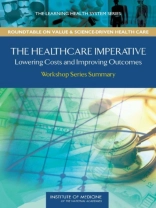The United States has the highest per capita spending on health care of any industrialized nation but continually lags behind other nations in health care outcomes including life expectancy and infant mortality. National health expenditures are projected to exceed $2.5 trillion in 2009. Given healthcare’s direct impact on the economy, there is a critical need to control health care spending. According to The Health Imperative: Lowering Costs and Improving Outcomes, the costs of health care have strained the federal budget, and negatively affected state governments, the private sector and individuals. Healthcare expenditures have restricted the ability of state and local governments to fund other priorities and have contributed to slowing growth in wages and jobs in the private sector. Moreover, the number of uninsured has risen from 45.7 million in 2007 to 46.3 million in 2008. The Health Imperative: Lowering Costs and Improving Outcomes identifies a number of factors driving expenditure growth including scientific uncertainty, perverse economic and practice incentives, system fragmentation, lack of patient involvement, and under-investment in population health. Experts discussed key levers for catalyzing transformation of the delivery system. A few included streamlined health insurance regulation, administrative simplification and clarification and quality and consistency in treatment. The book is an excellent guide for policymakers at all levels of government, as well as private sector healthcare workers.
Institute of Medicine & Roundtable on Evidence-Based Medicine
Healthcare Imperative [EPUB ebook]
Lowering Costs and Improving Outcomes: Workshop Series Summary
Healthcare Imperative [EPUB ebook]
Lowering Costs and Improving Outcomes: Workshop Series Summary
购买此电子书可免费获赠一本!
语言 英语 ● 格式 EPUB ● 网页 852 ● ISBN 9780309186834 ● 编辑 LeighAnne Olsen & Pierre L. Yong ● 出版者 National Academies Press ● 发布时间 2010 ● 下载 3 时 ● 货币 EUR ● ID 7143466 ● 复制保护 Adobe DRM
需要具备DRM功能的电子书阅读器












